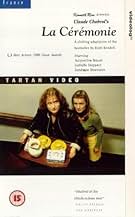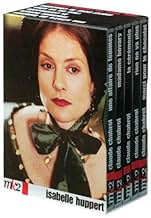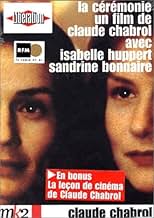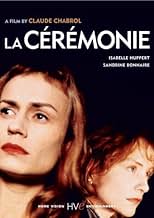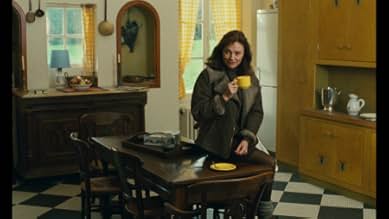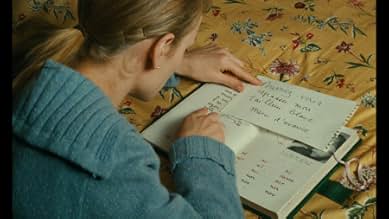VALUTAZIONE IMDb
7,5/10
14.729
LA TUA VALUTAZIONE
Una domestica di una ricca famiglia fa amicizia con un impiegato che la incoraggia a ribellarsi ai suoi datori di lavoro.Una domestica di una ricca famiglia fa amicizia con un impiegato che la incoraggia a ribellarsi ai suoi datori di lavoro.Una domestica di una ricca famiglia fa amicizia con un impiegato che la incoraggia a ribellarsi ai suoi datori di lavoro.
- Regia
- Sceneggiatura
- Star
- Premi
- 9 vittorie e 11 candidature totali
Recensioni in evidenza
I see this movie for the third time and can't prevent myself to notice the pure Claude Chabrol style in the critic of the rich people, especially in the province. But the ending is very bloody and surprising too. And in the mean time, since my last viewing, I saw PARASITES and I can't also prevent myself to see a thin line between the two features. If you have seen both features, you see what I mean. A pure delight.
I love Sandrine Bonnaire. Not love her in the "sell my possessions and move to Paris" love her, but love her in movies. In this movie especially. Every second she is on the screen, I was riveted to her. Her somewhat jerky and stiff physical mannerisms, her plain but beautiful face. And even though from the start we sense that her character is odd, creepy even, we can also feel her almost childlike panic and pain early on when we learn she can't read. It's enormously moving, and it creates a sympathetic bond with her that complicates how we view the events that follow. I just love her, and that probably clouded my overall estimation of the film. That's not to say the film is otherwise weak. It's not. The exploration into the class conflict between the rich and their help was excellent. And so was the portrayal of the sociopathic personality, shifting from sweet smiles to cold-bloodedness in a process devoid of emotion. Chilling, especially so when the sociopath is a waifish beauty. It's a very good movie made great by Sandrine Bonnaire's performance.
I watched this on video without reading the plot summary on the video box (or the user comments here), and I highly recommend seeing it without knowing too much about the plot. It is a gripping, Hitchcockesque character portrayal that slowly builds great tension and a sense of foreboding. Let all the clever foreshadowing pique your imagination; the ending will be that much more effective.
The performances were fine, Huppert in particular was a lot of fun to watch, but the camera direction was awful, completely chilly and remote like the worst of Haneke's work. The remove and coldness, this intentional distance leaving room for judgment from the filmmaker (and the audience) rather than more fluid and closer shots encouraging closeness and empathy, really made the whole thing lackluster, at best. Also, there were some very heavy handed and poorly drawn moments used to bash us over the head with the weight of Sophie's secret. Having not read the source material, I'll reserve my opinions on the script, but it felt to me like a completely uninspired outing and can only imagine Chabrol took the job only for the money as he seemed to never find anything that interested him in the story.
In this character study of two hateful middle-aged women (not so middle-aged in the movie, however, as in the novel by Ruth Rendell) we are made to fathom the bad that may befall the good.
Claude Chabrol's direction is clean, crisp and uncluttered--which isn't always the case, witness his Madame Bovary (1991), which is a bit too leisurely and L'Enfer (1993) which muddles a whole lot. Maybe it's the editing. Anyway this is more like his quietly brilliant Une affaire de femmes (1988) with a fine script and striking performances by Sandrine Bonnaire and Isabelle Huppert, handsomely supported by Jacqueline Bisset, Jean Pierre Cassel and the very pretty Virginie Ledoyen.
Bonnaire plays Sophie, an intense taciturn woman harboring dark secrets, whom the Leliévres have hired to cook and keep house at their country home. Bisset is Catherine Leliévre and Cassel her husband. They exist in bourgeois heaven avec matrimonial bliss with two teenagers, a family so closely knit and so charmingly together that they watch a two-part production of Mozart's Don Giovanni on TV, just the four of them cosily on the couch.
Well, this sort of unobtainable happiness doesn't sit well with Jeanne (Huppert) who is a lowly postal clerk living alone whose past includes the (accidental?) killing of her four-year-old daughter. Jeanne takes a fancy to the Leliévre's strange new maid with the idea of showing her something besides work. They strike up a fateful friendship that we know is leading to something horrible.
Huppert is as good as I've seen her, which is very good indeed. She is particularly striking here in an uncharacteristic role as a spiteful, working class woman with a heart of vengeance against anybody better off than she is. There is just a touch of sly irony in her performance suggesting that she is having a particularly good time playing the nasty. Bonnaire's stark performance as the unbalanced and humorless, reclusive Sophie will remain etched in your brain. Apart they are like inert, harmless chemicals. Together they catalyze one another and become brazen and explosive.
The story, filled with little foreshadowing of the tragedy to come, gilds the lily of our tristesse by making the Leliévres so very, very nice. We are reminded of the violent hatred by the proletariat toward the privileged classes, in this case acted out by two loonies against an innocent, but representative family, echoing not only the Russian Revolution but even more so the French Revolution, now two hundred years old.
What I am trying to figure out why this is called La Cérémonie. Maybe it is a ceremony of execution.
(Note: Over 500 of my movie reviews are now available in my book "Cut to the Chaise Lounge or I Can't Believe I Swallowed the Remote!" Get it at Amazon!)
Claude Chabrol's direction is clean, crisp and uncluttered--which isn't always the case, witness his Madame Bovary (1991), which is a bit too leisurely and L'Enfer (1993) which muddles a whole lot. Maybe it's the editing. Anyway this is more like his quietly brilliant Une affaire de femmes (1988) with a fine script and striking performances by Sandrine Bonnaire and Isabelle Huppert, handsomely supported by Jacqueline Bisset, Jean Pierre Cassel and the very pretty Virginie Ledoyen.
Bonnaire plays Sophie, an intense taciturn woman harboring dark secrets, whom the Leliévres have hired to cook and keep house at their country home. Bisset is Catherine Leliévre and Cassel her husband. They exist in bourgeois heaven avec matrimonial bliss with two teenagers, a family so closely knit and so charmingly together that they watch a two-part production of Mozart's Don Giovanni on TV, just the four of them cosily on the couch.
Well, this sort of unobtainable happiness doesn't sit well with Jeanne (Huppert) who is a lowly postal clerk living alone whose past includes the (accidental?) killing of her four-year-old daughter. Jeanne takes a fancy to the Leliévre's strange new maid with the idea of showing her something besides work. They strike up a fateful friendship that we know is leading to something horrible.
Huppert is as good as I've seen her, which is very good indeed. She is particularly striking here in an uncharacteristic role as a spiteful, working class woman with a heart of vengeance against anybody better off than she is. There is just a touch of sly irony in her performance suggesting that she is having a particularly good time playing the nasty. Bonnaire's stark performance as the unbalanced and humorless, reclusive Sophie will remain etched in your brain. Apart they are like inert, harmless chemicals. Together they catalyze one another and become brazen and explosive.
The story, filled with little foreshadowing of the tragedy to come, gilds the lily of our tristesse by making the Leliévres so very, very nice. We are reminded of the violent hatred by the proletariat toward the privileged classes, in this case acted out by two loonies against an innocent, but representative family, echoing not only the Russian Revolution but even more so the French Revolution, now two hundred years old.
What I am trying to figure out why this is called La Cérémonie. Maybe it is a ceremony of execution.
(Note: Over 500 of my movie reviews are now available in my book "Cut to the Chaise Lounge or I Can't Believe I Swallowed the Remote!" Get it at Amazon!)
Lo sapevi?
- QuizThe author Ruth Rendell has said that Claude Chabrol's version of her novel "A Judgement in Stone" is one of the few film adaptations of her work that she is happy with.
- Citazioni
Georges Lelievre: [referring, respectively, to Sophie the illiterate maid and Jeanne the nosy postal clerk] What a pair: one can't read at all, and the other reads our mail.
- ConnessioniFeatured in Isabelle Huppert: Message personnel (2020)
- Colonne sonoreCello Symphony
Composed by Benjamin Britten
I più visti
Accedi per valutare e creare un elenco di titoli salvati per ottenere consigli personalizzati
Dettagli
- Data di uscita
- Paesi di origine
- Sito ufficiale
- Lingua
- Celebre anche come
- The Ceremony
- Luoghi delle riprese
- Aziende produttrici
- Vedi altri crediti dell’azienda su IMDbPro
Botteghino
- Lordo Stati Uniti e Canada
- 873.196 USD
- Lordo in tutto il mondo
- 873.196 USD
- Tempo di esecuzione1 ora 51 minuti
- Colore
- Mix di suoni
- Proporzioni
- 1.66 : 1
Contribuisci a questa pagina
Suggerisci una modifica o aggiungi i contenuti mancanti

Divario superiore
By what name was Il buio nella mente (1995) officially released in India in Hindi?
Rispondi
![Guarda Bande-annonce [OV]](https://m.media-amazon.com/images/M/MV5BNzliMDEwMzYtMjg1NS00Mjc1LTkwNDktMzc1MmJkNDJjZDIxXkEyXkFqcGdeQXRyYW5zY29kZS13b3JrZmxvdw@@._V1_QL75_UX500_CR0)

